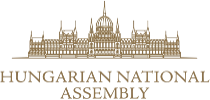The Fundamental Law sets down that Hungary is an independent, democratic state governed by the rule of law. Hungary's form of state is a republic, its form of government a parliamentary republic. The government is answerable to the National Assembly and governs the country with the confidence of a majority. Legislative power rests with the National Assembly, consisting of 199 Members in a single chamber.
The National Assembly holds sessions in the House of Parliament situated in Budapest on the bank of the Danube. The keys to the building being handed over in 1902, it has rightfully long been considered one of the most beautiful parliament buildings in the world – borne out by the hundreds of thousands of visitors every year. The important work of legislation takes place within its walls. Indeed, the work carried out here is worth a closer look, as the decisions of the National Assembly and the laws enacted here determine everyday life in Hungarian society.
Electing Members of the National Assembly
Before 2014, Hungary's (blended) electoral system was among the most complicated in Europe; it saw the election of Members of the National Assembly six times as of 1990. The system was reformed by Act CCIII of 2011 on the Election of Members of the National Assembly with provisions first implemented during the 2014 general elections. That spring, Hungarian citizens elected 199 Members of Parliament to a four-year term, voting directly by secret ballot based on universal and equal suffrage. The 2018 parliamentary elections were also held in this electoral system for the the 2018 - 2022 parliamentary cycle.
In the 2022 parliamentary elections the turnout of all eligible voters (including postal voters) was 69.59%. Finally, a total of 9 parties won mandates and was able to form a parliamentary group.
The following parties won mandates in the 2022 parliamentary elections:
|
Fidesz–Hungarian Civic Union (Fidesz) and the Christian Democratic People's Party (KDNP) (joint list) |
135 Members |
|
Democratic Coalition (DK), Movement for a Better Hungary (Jobbik), Momentum, Hungarian Socialist Party (MSZP), Politics Can Be Different (LMP), Dialogue for Hungary (PM) (joint list) |
57 Members |
|
Our Homeland (Mi Hazánk) |
6 Members |
All together 12 national minority self-governments put forward a national minority list and 11 of the candidates were elected as national minority advocates. The list of the National Minority Self-Government of Germans in Hungary (MNOÖ) gained a preferential mandate and its candidate became a national minority Member of Parliament.
Election results for parliamentary parties, 1990–2022
| Party | MDF | Fidesz | KDNP2 | FKgP | MIÉP3 | SZDSZ | Jobbik | MSZP | PM | LMP4 | DK | Momentum | Mi Hazánk | |
|
1990 |
First-round results (%) |
24.73 |
8.95 |
6.46 |
11.73 |
– |
21.39 |
– |
10.89 |
– |
– |
– |
– | – |
|
Total mandates |
165 |
22 |
21 |
44 |
94 |
33 |
||||||||
|
1994 |
First-round results (%) |
11.73 |
7.01 |
7.03 |
8.82 |
− |
19.73 |
– |
32.99 |
– |
– |
– |
– | – |
|
Total mandates |
38 |
20 |
22 |
26 |
70 |
209 |
||||||||
|
1998 |
First-round results (%) |
2.80 |
29.48 |
– |
13.15 |
5.47 |
7.57 |
– |
32.92 |
– |
– |
– |
– | – |
|
Total mandates |
171 |
148 |
48 |
14 |
24 |
134 |
||||||||
|
2002 |
First-round results (%) |
41.07 |
– |
− |
− |
5.57 |
– |
42.05 |
– |
– |
– |
– | – | |
|
Total mandates |
188 |
20 |
178 |
|||||||||||
|
2006 |
First-round results (%) |
5.04 |
42.03 |
− |
− |
6.50 | − |
43.21 |
– |
– |
– |
– | – | |
|
Total mandates |
11 |
164 |
20 |
190 |
||||||||||
|
2010 |
First-round results (%) |
– |
52.73 |
– |
− |
− |
16.67 |
19.30 |
– |
7.48 |
– |
– | – | |
|
Total mandates |
263 |
47 |
59 |
16 |
||||||||||
|
20145 |
Election results of national lists (%) |
− |
44.87 |
− |
− |
− |
20.22 |
25.57 |
– |
5.34 |
– |
– | – | |
|
Total mandates |
133 |
23 |
38 |
5 |
||||||||||
| 20185 |
Election results of national lists (%) |
– |
49.27 |
– |
– |
− | 19.06 | 11.91 | 7.06 | 5.38 | – | – | ||
|
Total mandates |
133 | 26 | 20 | 8 | 9 | – | – | |||||||
| 20225 | Election results of national lists (%) | – | 54.13 | – | – | – | 34.44 | 5.88 | ||||||
| Total mandates | 135 | 57 | 6 | |||||||||||
117 MDF Members won in individual constituencies as joint Fidesz-MDF candidates.
2The KDNP did not nominate a list of candidates in 2002.
3MIÉP was established in 1993 and first ran in 1994.
4The LMP was established in 2008 and first ran in 2010.
5Single-round elections as of 2014.
Total mandates: including the number of Members who won in individual constituencies.
New electoral law
In December 2011, the National Assembly enacted a new law (Act CCII of 2011) on the election of Members of the National Assembly, which was to be applied for the first time during the next general election held on 6 April 2014. Voters thus elected a National Assembly, now with 199 Members, that was smaller than before. 106 Members won seats in individual constituencies, and 93 did so on national lists of candidates. A national list may be a party list or a national minority list. For the first time, citizens of a particular national minority in Hungary were also able to elect a national minority member. 13 national minorities, each with its own country-wide self-governing body, enjoyed the opportunity to nominate candidates on a national minority list. In addition, this was the first time that Hungarian citizens without a permanent residence in Hungary (and residing beyond its borders) were able to vote for a party list. Also, in a departure from previous practice, parliamentary elections are now held in a single round, rather than two rounds.




